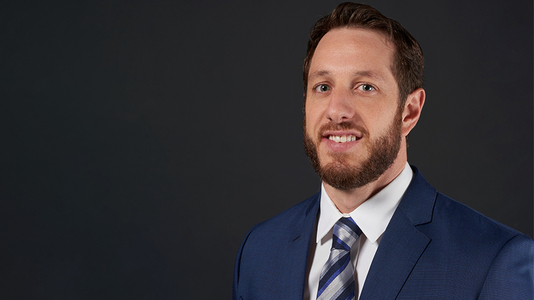

NICOLAS MARCHON
Director of Marketing
Thermo Fisher Scientific
CMO COUNCIL: Tell us a little about your background and how you got to where you are now.
MARCHON: I had a very unusual start actually. Both my first graduation and master’s degree had scientific biology background and my first job was in a small dealer in a sales position, which by the way I think everyone should once experience. Only 3 months later, a large multinational company I admired a lot – whereby the way I remain up to this date – recruited me for a similar role. Intense few years expanding portfolio coverage, taking care of key accounts, and only then I was formally introduced to marketing during the MBA. Later, I took a product management position, then a market development role, which taught me a lot during dynamic 3 years that included the opportunity to live abroad for a global assignment, definitely a highlight of the period. At that time, I was starting a transition toward people management, and I've been asked to lead the marketing structure of the larger business in the region. Four years later, in October of 2021 to be more precise, I had the honor to be invited for my current role, which actually did not exist previously, leading the whole marketing organization of Thermo Fisher Scientific in Latin America.
CMO COUNCIL: What’s the best piece of career advice you’ve been given? Or what career advice would you give to developing marketing leaders?
MARCHON: This particular advice I’ve been given by a mentor on my very first day leading other people: From now on, you shine through your team. It's simple, but it was transforming to me as I used to receive a lot of attention and praise while an individual contributor and it made me understand that our job as people leaders is to make people shine….with everything the “shining path” requires, of course.
In such a challenging and changing environment, one piece of advice I’d give is to choose your battles carefully. There is not enough energy nor time or need to fight them all. We lose way too many if we try to do it. Instead, pick a few to simply decline and be able to dedicate energy and resources to fight the most important ones. To you, your team, your company.
CMO COUNCIL: What are some of the secrets to better collaboration with peers in the C-suite and lines of business?
MARCHON: The main challenge is that different business departments live for different metrics and targets. Though, that's also the business beauty, as by doing so, we often work towards the broad common goal. So, different than what a lot of people try to do, I try to understand other leaders' priorities, before pitching mine. It gives me the opportunity to understand (i) how they think, (ii) how I can potentially help them, and (iii) ultimately, how to better “sell” ideas or projects to them. As for different business lines or units, my conversation is towards our common goal: sell more. Every company has it as the key goal, right? Marketing is often focused on providing, a less focused perspective of the sales funnel. While business leaders are heavily focused on conversion (again, that's kind of the beauty as well, they should indeed be), we must remember that it all starts very high at the funnel, meaning brand awareness. So, these people I'm impacting won't buy the product you want to sell tomorrow. But I still need to do it, so they buy tomorrow.
CMO COUNCIL: How do you describe your leadership style?
MARCHON: Again, I lean on balance. Diverse teams working in a volatile environment will demand different styles depending on multiple factors. I'm inspired by leaders that are able to navigate some of these styles to better manage specific circumstances. As people, we all have our personalities and over time it becomes clear but showing flexibility and acknowledging that even leaders will eventually adapt is a sign of humility that keeps us growing. I'm a strong believer that happy people work better, so the work environment needs to be a priority, and taking care of people before employees is very important to me. In that sense, it is also critical to build a sense of belonging. In order for a team to work together towards a common goal, people need to know that every input is valid, especially the conflicting ones as it usually pushes for the best outcomes. Another component of a successful team I leader must build is ownership. Especially through increasing Agile methodologies adoptions, all team members must have clear not only individual contributions, but how it impacts the final team deliverables. If results are bad, that’s on everyone, especially the leader. If they are good, shared credits with everyone. Lastly, I appreciate empowerment rather than micromanagement. Once you have good talents and trust them, they should be empowered to suggest and act, aligning when it's really needed.
CMO COUNCIL: What market shifts and trends are impacting customer and competitive dynamics in your industry?
MARCHON: Digitalization is an obvious one. When we talk about ebusiness, most of the markets we serve though can be considered segment late adopters when you compare it to retail for instance. That's because we sell solutions that won't only impact you, your day, or your home. It will be implemented by a laboratory, a hospital, or a company. But from a demand perspective, it's already there. There is no transition between personal and professional profiles. Same people that navigate on social media looking for entertainment or something to potentially buy, can be impacted by our ads or posts, for instance. The key is content, delivering interesting, quality content. Broadly, it brings another great impact as well. If we take the healthcare environment for instance. We provide diagnostic solutions that are prescribed or recommended by physicians. So, until years ago, they were our marketing audience. But the patient today researches a lot before and after going to the doctor. So, they (the broad audience) are our focus as well. Obviously, through an entirely different communication strategy. But in order to be effective nowadays, we often need to reach out to both of them in parallel. Data
CMO COUNCIL: What is your personal philosophy on marketing?
MARCHON: I believe the best marketing definition is the simplest one: doing marketing is helping people to find your products. By emotions and feelings, through a differentiated experience, etc.? Ok. Products that are not only products but rather solutions to help, maybe for needs that customers don't even know they actually have? Ok. “Omnichannelly”, through relevant content, with no interruption, finding the niche of the niche of the niche? Yes, it all makes sense. It really does. But it can’t change the basic fact that marketing is here to drive the business. Marketing has a lot of key indicators, but its first metric is revenues, and it's pointless to argue against it. I do like to watch emotional campaigns, that make us connect with brands at another level. But they are there to make us choose that brand ultimately when we have the opportunity to do so. So, my philosophy is that simple: everything we do in the marketing department should be driven by trying to make it easier for our customers to find and eventually buy from us.
CMO COUNCIL: What are your three non-negotiable daily habits that you believe contribute to your success?
MARCHON: It's interesting that only one of them is actually work-related. And it tells a lot about my personal philosophy, which is to have balance. The 2 not work-related allow me to be more productive at work. So, the first is to have some time with my family, especially my son. I either take him to school in the morning or dedicate some time to play with him before he goes to bed at night. When I'm traveling, it's through a video call, not the same, but still, I do it daily, no matter what. That's kind of a routine for the heart if you will. The second one is to exercise. At least 30 mins, every day. Sometimes in the morning, others at night, eventually using my lunchtime. But I do. That makes me feel better. If there are one or a couple of days that I just can’t, then I compensate for it on weekends. That’s the routine for health. People often underestimate it. But it's not rocking science, not healthy people just can't work. And the third one is really work-related and it's something like a leadership routine. If someone in my team wants to speak with me, I find the time. There is no such thing as a lack of time. There is only prioritization. And my team needs to be a priority to me. They text or call me saying they need to speak with me, I ask if it's urgent. If yes, they will have my time. Sometimes it's about their personal lives, others about work, some critical ones, some not that much, some I can really help, others I help by listening basically. But it's important to them and if it's important to them, it needs to be to me. Over time, they understand I'm there for them when it's a priority and really ask for time “immediately” only when it's really a priority. It helps build trust and a sense of urgency.
CMO COUNCIL: What is a quote or saying you live by?
MARCHON: (The essence of) “strategy is often what you decide not to do”. Michael Porter was a master of strategy, but to me, the most brilliant is one of the simplest ones. There are 100 things we can do, maybe 30 we really need to do, but we can't do them all at once. I believe multitasking is overrated. I rather focus on one thing at a time. So, I start my day by listing and reviewing the things I have to do. That's my roadmap. I have several on the parking lot (“nice to have” things to do, not urgent), a dozen or so on my 2 weeks list (what I need to do over the next couple of weeks, so I have on my calendar and eventually transition to the last one) and a few that I need to do today (the urgent and important ones). Obviously, there are demands that take a fast track, depending on requests and dynamics. It reinforces the importance of not having 10 important things to do today, to allow accommodating eventually, if it really needs to be done today. But the most strategic exercise is to decide what you will not be doing today, so you have enough time and energy to do what you have really decided to do.
